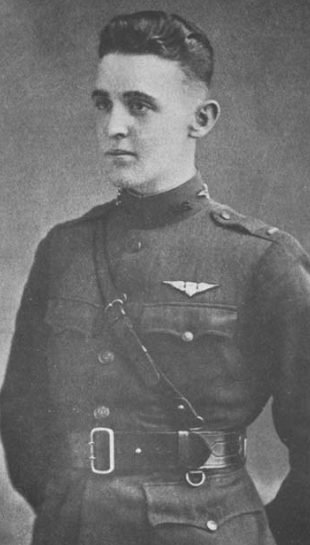Waller Lisle Harrison, Jr., of Lebanon, Kentucky, was a former member of the American Field Service. He was killed in an airplane accident in France on October 3, 1918, and is now buried in the St. Mihiel American Cemetery, Thiaucourt, France. 2Lt Harrison was one of the 171 American servicemen who trained at the Third Aviation Instruction Center in France and died between 1917-1919.
From Find a Grave:
American Field Ambulance Service
Harrison joined the American Field Service in February 1917, serving in sections 12 and 3. After nine months he was released to go into Aviation. He was 22 years of age, a student at Oberlin University and his home was in Oberlin, Ohio.
Born July 12, 1896, in Lebanon, Kentucky. Son of Waller Lisle and Margaret Dugan Harrison. Educated Lebanon High School, Louisville Training School, and Oberlin College, Class of 1919. Joined American Field Service, February 14, 1917 ; attached Section Twelve in France and Three in Balkans to November 6, 1917. Enlisted U. S. Aviation. Commissioned Second Lieutenant.
Killed in aeroplane accident, October 3, 1918, while training, Aviation Instruction Center, Issoudun. Buried American Cemetery, Issoudun, Indre.
"Harry was good as an aviator as in everything else he tried," writes one of his comrades, "and his death was caused by his overzealousness in doing his duty. He went into the air when he was feeling badly and should have rested, because he felt that he must fly in order to get in his work and not hold up the classes. His idea was most commendable, the result of it most disastrous, but it just went to make up the calibre of the boy."
His father has written of him: "Early in life he developed qualities which indicated that he thought for himself, drew his own conclusions, and was true to his convictions regardless of consequences."
From February until November, 1917, he served with the American Field Service, first on the western front, as a member of Section Twelve, and later with Section Three in the Orient. Of a particularly attractive personality, --- popular, daring, and with many choice friends, --- he quickly made a place for himself in both Sections as the following quotation from one of his companions proves: "Unselfish, generous to a fault, he was truly a man among men and the example of living that he set helped us all."
When, in November, he was released from the Field Service on his return from Albania, his greatest desire was to be accepted in the Aviation Service of the American Army. Although he might easily have returned to America, or enlisted in some other branch of service in France, he waited for six long weeks for his application to go through, working, in the meantime, at such odd jobs as he could find in Paris, making enough to buy a scanty allowance of food, and sleeping on the floor, with his army blankets as his only bed, yet never for a moment regretting his decision to hold out for aviation.
He was the type of lad destined to serve the world and he served it to his utmost. Not only did he give his service and his life to the cause for which his country was fighting, but more than this, he bequeathed to his comrades the memory of a character and personality which must always be an inspiration to them. As one of them has written of him:
"His was the supreme sacrifice and such a man was he that he met it as only a gentleman and a good soldier could meet it, for that was Harry throughout his life. His memory will never pass, for he was chief among us in giving the true conception of what real life is like. We are weighed down with the sadness of his passing, but such was the man and such the cause for which he died that the sadness can be only for the lonesomeness we feel. He has shown us the way, the hardest way that we shall ever have to go, and with the memory of his graciousness in doing his duty, our duty seems easy."

PRIVATE CITIZENS SUPPORTING AMERICA'S HERITAGE
American
War Memorials Overseas, Inc.
War Memorials Overseas, Inc.
Harrison Waller Lisle Jr.
Name:
Waller Lisle Jr. Harrison
Rank:
Second Lieutenant
Serial Number:
Unit:
American Field Service
Date of Death:
1918-10-08
State:
Kentucky
Cemetery:
St. Mihiel American Cemetery, Thiaucourt, France
Plot:
A
Row:
28
Grave:
15
Decoration:
Comments:
